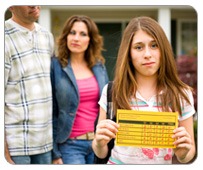“I Want It Now!” How to Challenge a False Sense of Entitlement in Kids
by James Lehman, MSW
 Almost as soon as your child begins to talk, you’ll start to hear him ask for things. In fact, when an infant cries, he’s asking for food or to be made more comfortable. By the time he reaches the age of four or five, his constant refrain becomes: “Can I have this, Mom? Can I have that?" The unending requests for new toys or candy and an “I want it now” attitude may follow you every time you go to the store. Parents want to give to their kids for many reasons. It's partly instinctual—back in the Stone Age, “giving to your child” might have meant providing food, shelter and protection. Those urges are still there. Unfortunately, if you give in to every little want and need your child expresses, you are really feeding and nurturing a sense of false entitlement—which I believe can lead to problems later on.
Almost as soon as your child begins to talk, you’ll start to hear him ask for things. In fact, when an infant cries, he’s asking for food or to be made more comfortable. By the time he reaches the age of four or five, his constant refrain becomes: “Can I have this, Mom? Can I have that?" The unending requests for new toys or candy and an “I want it now” attitude may follow you every time you go to the store. Parents want to give to their kids for many reasons. It's partly instinctual—back in the Stone Age, “giving to your child” might have meant providing food, shelter and protection. Those urges are still there. Unfortunately, if you give in to every little want and need your child expresses, you are really feeding and nurturing a sense of false entitlement—which I believe can lead to problems later on.
The attitude of a child with a false sense of entitlement is, “I am, therefore give to me.”
I think it’s important to keep in mind that parents and kids get some powerful messages in our society. One of the most prevalent is, “The more you give your child, the better parent you are.” Children are also led to believe they're entitled to receive. Commercials, TV shows, movies, and their friends at school all tell kids, “This is the new thing. This is what everybody's getting. If you don’t have it, you won’t be cool.” So it’s easy for you as a parent to feel obligated to give to your child—and pretty soon, your child will grow to expect it. This can lead to parents giving much more than their kids need—and sometimes, more than their family can really afford.
Children also get a false sense of entitlement by being overly praised for things, and rewarded for tasks that they should be doing as a matter of course. There’s nothing wrong with rewarding achievement and excellence, but it becomes a problem when you reward mediocre efforts.
I’ve also worked with many parents who have the following fantasy: they imagine their child talking to their friends, saying, “My parents are great. They got me these new sneakers.” Or, “My dad’s the best—he bought me this bike.” Maybe your child is saying that, and maybe he’s not. Regardless, this thought often makes parents feel proud and good about themselves, and it motivates them to spend more than is good or necessary. There are those parents who want to be their child's friend—and consequently, they will often buy their child things because they’re afraid they’ll lose the friendship. This pattern may continue until the child reaches young adulthood. By that time, he firmly believes that his parents “owe” him whatever he wants. So the confluence of instinct and social pressure—and the need to be liked by their kids—can often make parents overindulge their children.
Let me be clear: I’m not saying it’s not a good thing to give to your children. But I do believe that the way you give to them can either help them develop a sense of ownership by earning things, or nurture a sense of false entitlement because they’re usually getting what they want, when they want it. And when kids grow up with a false sense of entitlement, you'll see them thinking they're entitled to expensive toys, electronic gadgets, trips and cars without having to earn them. They will do poorly in school and still want that car when they turn 18—and expect to get it. They’ll even tell their parents there's something wrong with them if they don't give them what they want, regardless of the family’s financial situation. The attitude of a child with a false sense of entitlement is, “I am, therefore give to me.”
So how do you challenge that false sense of entitlement in kids, and why is it so important to do so? I believe it’s critical to challenge them because once your child grows up and goes out into the real world, he will have to work for what he wants, just like everyone else. So as a parent, it’s important that you teach your child the value of hard work and earning things. He needs to really see that integral connection between making an effort and achieving success. Conversely, when things are handed to your child, the message he’s getting is, “You don’t need to do anything—everything will be given to you in life just because you’re you.”
If you want to start challenging this pattern in your child, I recommend the following techniques.
Challenging the False Sense of Entitlement in Kids
Ask Yourself, “What Do I Want My Child to Learn?”
Whenever you want to get a message across to your children, I think it’s important to think through what you really want to teach them. Ask yourself, “What do I want my children to learn about money and work to achieve success in life?” And then come up with a procedure that will teach them about finances. Some concepts which I think are important to teach from a young age are:
- Money doesn't come easily.
- People work hard to earn money; it’s part of life.
- If you want something, you need to work to earn it.
- You are not entitled to things you haven’t earned.
Break these concepts down for your child. You can say, “You can’t make a video game yourself. But when you’re old enough, you can work at Wendy's for a week and get enough money to buy a video game somebody else made.” You can take it one step further by asking, “And why did they make that video game? So they could earn enough money to eat at Wendy's.” Use the teaching role to help your child start connecting the dots. Think about what you want your child to learn and what you want him to take away from the conversation, because that is going to set the tone for the way he thinks about what he earns—and what you give him—from now on.
Set Some Limits on Giving to Your Kids
I think it’s important to put limits on what you give your children. Don’t feel as if you need to give them every little thing they ask for, even if “all the other kids have one.” I think it’s also a good idea to talk to your kids and let them know that you don’t have an infinite supply of money at your fingertips. Tell them from an early age that you and/or your spouse work to make money to support your family. Try to explain that you trade your time for money in order to take care of your household.
When your child asks for things, I think it’s perfectly fine to say, “You’re welcome to buy that with your birthday money,” or “Why don’t you put that on your Christmas list?” Or, “Why don’t you save up your allowance money and buy it?” Saying “no” to your child does not make you a bad or uncaring parent—it just makes you a practical one who wants to teach your child to understand money in a more realistic way.
Tell Your Child the New Rules
Let’s say that up until now you've been giving your child whatever he wants without expecting him to work for it. If you want to give your kids money or things, I think it’s important to come up with a system where you can deliver the goods to them in such a way that they feel like they’ve earned them. In my opinion, paying for extra work around the house is better than giving an allowance, because it gives you more flexibility as you reward them.
If you want to make some changes, I think you should sit down and have a frank discussion with your child.
Younger Kids: For younger children and pre-teens I think you can say something like, “Listen, I want you to learn how to earn some of the things you want by doing extra work around the house. I don’t mean by doing your regular chores, like setting the table or doing the dishes. So for instance, you could mow the lawn, shovel the walk when it snows, or clean my car when it’s dirty. Instead of giving you an allowance, I’m going to pay you to do these things. We’re going to start this Saturday. If you want to earn money, you’ll have to see me Saturday morning to find out what you can do.” Then, determine how much you want to pay him for these jobs and make sure it’s within your budget.
Adolescents: When you talk with adolescents, you can expect a serious reaction to your words, especially if they’ve come to expect to get things without having to earn them. After all, they’re probably very happy with the way things are right now, and they may balk at the idea of having to work for what you give them. The way you prepare for that is by saying to your child, “I have something that I need to talk to you about that's really affecting our finances. You're going to have to keep an open mind and be mature during this conversation. So why don't we get together at four o'clock. This is actually a great technique for you to use with your child. I used to say to kids in my office, “Listen, do you want me to talk to you like a young adult or a little kid?” Naturally, they'd always pick young adult. And then I’d keep my word and talk to them utilizing facts, not feelings. That means I would speak respectfully, frankly, and persuasively. In my opinion, when we talk to teenagers and young adults, we have to be as persuasive as we can be. So when you speak to your teen, try to put things in his best interests: “I want to help you earn some cash because I know you really want to buy that new video game. Here’s how you can make some extra money around the house.” If your child refuses to do odd jobs around the house, the next time he asks for things, you can simply say, “You know how you can earn that new DS. When you’re ready to clean out the garage, I can pay you and you can start saving up.”
Have Your Child Work to Earn Money
If you have the financial capability and you believe in the concept of paying kids to do work around the house, I personally think it’s better to give your child money for doing odd jobs rather than give him a weekly allowance. This way, your child will learn how to manage his finances, and he will also make the connection between work and payment. So let’s say your child gets $10 a week for mowing the lawn. (By the way, he shouldn’t receive this money until the lawn is done.) Then if he wants a video game that costs $50, he has to save for it—that’s how you develop a sense of earned entitlement. Later, a job at Wendy's making $6 an hour will look really good to your child. He'll take that job for 12 hours a week part-time, because he’ll understand that it will bring him $70 a week. He’ll be able to buy a new video game every week if he wants to, and he'll be entitled to do so because he earned it.
If Your Child Doesn’t Comply, Pay Their Siblings to Do the Work
I think it’s important for your child to understand when you’re giving him a gift. To put it simply, he needs to realize that he’s not simply entitled to whatever you give him. How do you do this? This one is a piece of cake. You just say clearly, “I wanted to give you something extra.” Or “Here's a gift from your mother and me.” Be sure to differentiate this from the money you give him for allowance, or the money he might earn from getting on the Dean’s list at school.
Remember, the danger is not having a sense of entitlement; the danger is having a false sense of entitlement. People who have this mindset often hold a negative view of hard work—they put it down and ridicule it. They think they deserve things they haven't earned, and they can develop contempt for people who work to earn things.
I believe that a false sense of entitlement affects every strata of society today. Kids who grow up this way don't want the jobs that are available because they have the belief that they're entitled to something better without having to make an effort. So that false sense of entitlement prohibits them from getting the work skills and the social skills they need to start at the bottom and work their way up.
One of my first jobs involved carrying bolts of cloth in a dress factory and loading trucks. I was 16 years old and I made $1.25 an hour. I didn’t think working hard to earn things was unusual because I had watched my father work all my life. He grew up during The Great Depression, and he always said, “If you want something, you have to work for it.”
Here’s the bottom line: When kids have a false sense of entitlement, they don’t see the world in real terms. When money and material goods have been handed to them their whole lives, the danger is that they won’t have the idea that they should work hard to achieve their goals. Their view of the world will be, “If I want it, someone will give it to me”—but as we all know, that’s just not the way the world functions. Once you leave your parents’ house, it’s up to you to make an effort to achieve some success in life. Sadly, you will often see older children living with their parents into adulthood, because that’s where things are easiest for them. But make no bones about it, that skewed view of the world is going to affect them in a negative way their whole lives.
The good news is that you can start teaching your child now about what it means to work hard to achieve goals in life—before it’s too late.
“I Want It Now!” How to Challenge a False Sense of Entitlement in Kids reprinted with permission from Empowering Parents. For more information, visit www.empoweringparents.com
 | James Lehman is a behavioral therapist and the creator of The Total Transformation Program for parents. He has worked with troubled teens and children for three decades. James holds a Masters Degree in Social Work from Boston University. For more information, visit www.thetotaltransformation.com. |

 Do you feel like your family members, your kid’s teachers, and even counselors blame you for your child’s acting out behavior? You’re not alone. As James Lehman says, there are countless parents out there “living in little prisons”—feeling trapped, isolated, and ashamed of their child’s defiant or out of control behavior. If you’re in this situation, James has a message for you: you aren’t your child’s problem—you are the solution.
Do you feel like your family members, your kid’s teachers, and even counselors blame you for your child’s acting out behavior? You’re not alone. As James Lehman says, there are countless parents out there “living in little prisons”—feeling trapped, isolated, and ashamed of their child’s defiant or out of control behavior. If you’re in this situation, James has a message for you: you aren’t your child’s problem—you are the solution. 
 This week, James tells you how to handle the specific changes you might suddenly see in your child during adolescence, from backtalk to attitude to slipping grades.
This week, James tells you how to handle the specific changes you might suddenly see in your child during adolescence, from backtalk to attitude to slipping grades.
 In part one of this two-part series, James Lehman explains why kids change so much during adolescence, and he warns us about the sudden changes of which every parent needs to be aware.
In part one of this two-part series, James Lehman explains why kids change so much during adolescence, and he warns us about the sudden changes of which every parent needs to be aware. Does your child often perceive himself as being right when he’s wrong and wrong when he’s right? Some children have a hard time picking up on other people’s expressions, body language or social cues. These kids are often prone to thinking they’re being disapproved of or disliked when they’re not.
Does your child often perceive himself as being right when he’s wrong and wrong when he’s right? Some children have a hard time picking up on other people’s expressions, body language or social cues. These kids are often prone to thinking they’re being disapproved of or disliked when they’re not.


